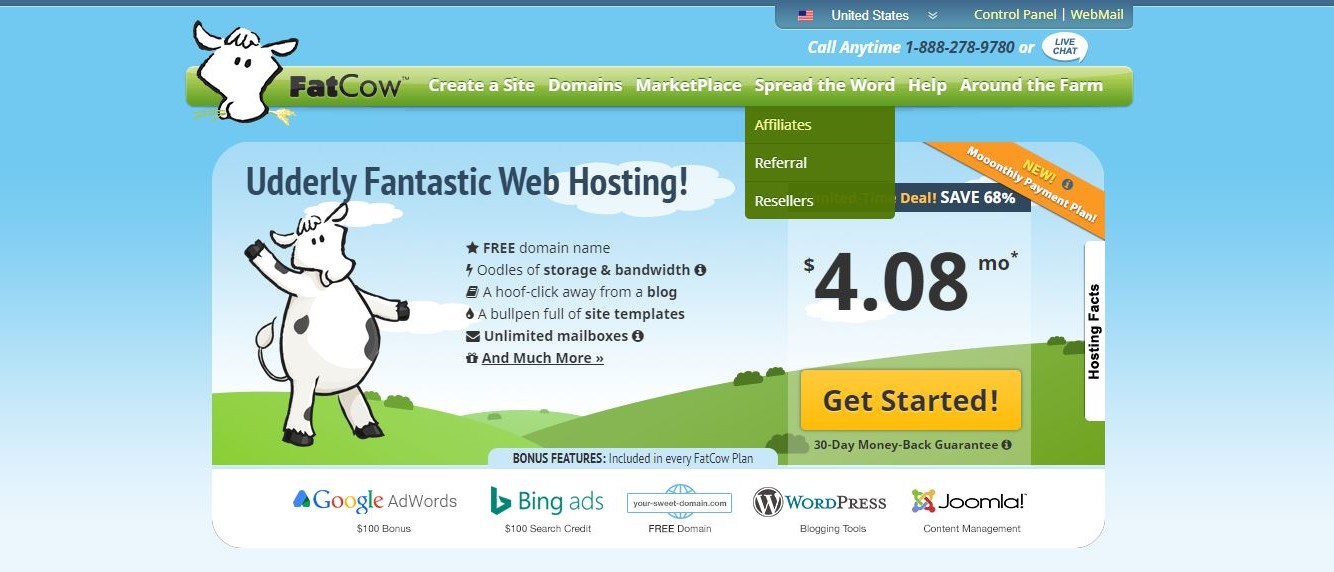TechRadar Verdict
FatCow is a versatile US-based web hosting provider with a decent number of hosting solutions primarily aimed at newcomers. Although it offers a few attractive features, it’s unlikely it will attract more seasoned webmasters.
Pros
- +
24/7 customer support
- +
30-day money-back guarantee
- +
Easy-to-use website builder
- +
Eco-friendly attitude
- +
Free domain registration
Cons
- -
Money-back guarantee is valid for credit-card payments only
- -
No free backups
- -
No uptime guarantee and below-average performance
- -
Windows hosting isn’t supported
- -
Significant increase in prices after the initial period
- -
Only one plan for dedicated hosting
Why you can trust TechRadar
Launched in 1998, FatCow is one of the oldest web hosting providers on the market, as well as the one with the most peculiar name. The company is based in Albuquerque (USA) with an aim to deliver a budget-friendly and easy-to-use hosting solution to all businesses regardless of their size. Besides, another notable selling point is their eco-friendly approach, as they claim to power up all of their offices and facilities using wind energy.
For all those wondering why the name “FatCow”, the company provided a semi-satisfactory answer on their main website. Well, to be precise, they’ve answered a question with another question (Why call a computer an apple?) and have completely avoided giving a straight answer. We can only presume that there is no special secret or hidden meaning behind the company name.
- Want to try FatCow? Check out the website here
At present FatCow employs two data centers, both in Boston (USA). They claim that both are equipped with constant security monitoring, that they run on N+1 power (both A/C and D/C) and have identical network architecture and equipment.
Choosing “Around the Farm” on the main menu will present you with a decent “About” section, “Testimonials” (which is a collection of cherry-picked comments about the company), “Press” (an archive with nothing newer than 2010) and FatCow’s official blog. The latter one looks white and plain in style with a sidebar listing all articles by date of publication. They range from the April of 2009 up to April of 2016, where they seem to stop. As an alternative, you can use a search box. The articles themselves are often written in how-to manner, seem rather helpful and often feature a large number of responses from past users (mostly questions), making the blog feel somewhat like a support forum, which is actually not a bad thing.
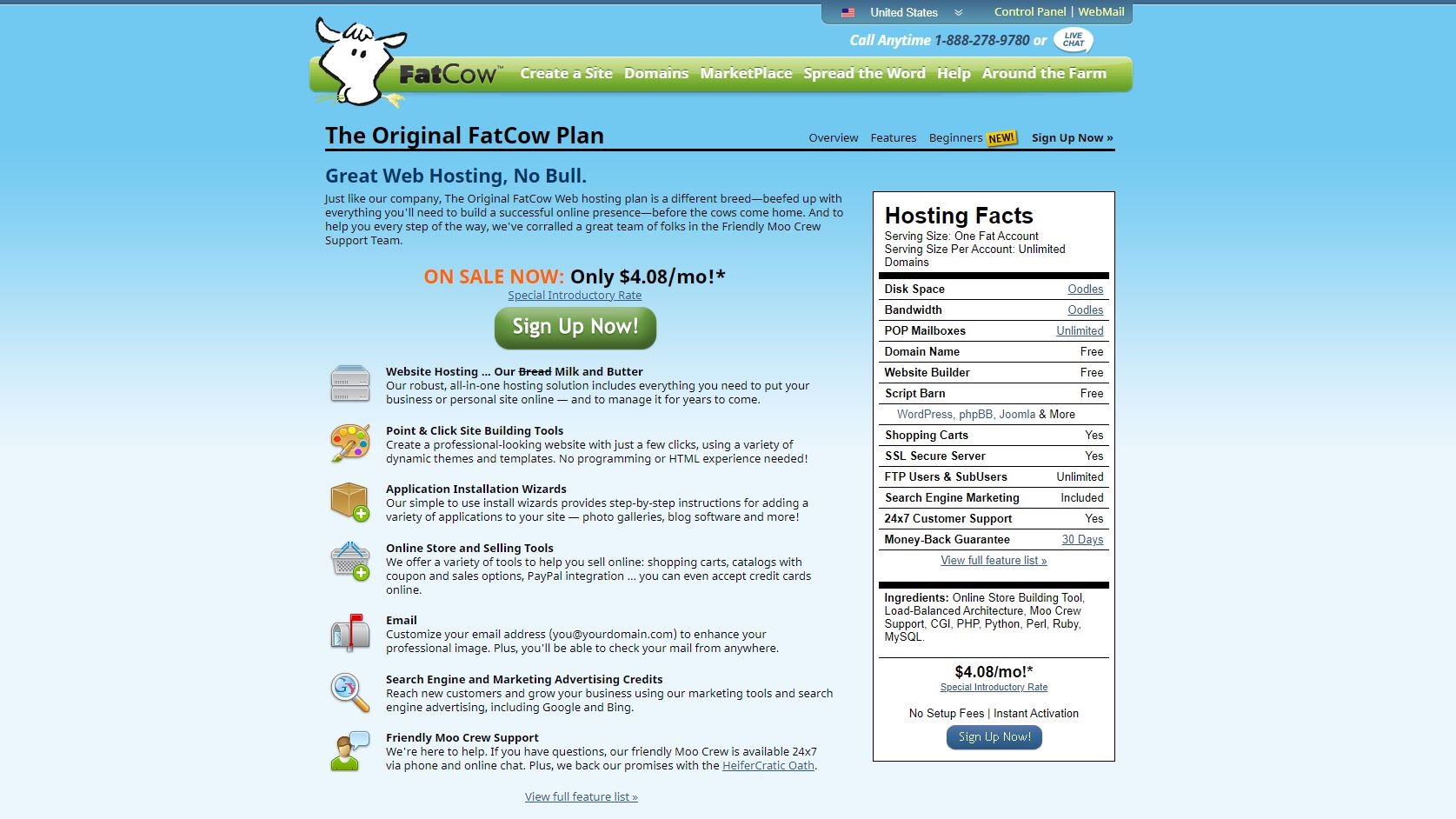
Plans and pricing
As a part of their marketing strategy, FatCow regularly offers coupons, discounts and promotional prices, particularly those aimed at first-time users. There are four main hosting plans varying in type, size and purpose.
The first one, called the “Original FatCow'', covers shared hosting solutions ideal for both blogs and web stores. It starts at $4.08 (which is a promotional price) per month and provides unlimited number of mailboxes, “oodles” disk space and bandwidth, SSL certificate, free domain registration and a charge-free point-and-click website builder.
Besides this, FatCow offers WordPress hosting with two different-sized plans, VPS and dedicated servers, with the last two coming with three available plans.
Sign up to the TechRadar Pro newsletter to get all the top news, opinion, features and guidance your business needs to succeed!
All above-mentioned plans go with a 30-day money-back guarantee, but it is valid with credit-card payments only, which seems rather reductive although not unseen.
Payments can be made by all major credit cards and PayPal.
| Yes | No | Header Cell - Column 2 | Header Cell - Column 3 |
|---|---|---|---|
| Shared hosting | Colocation hosting | Row 0 - Cell 2 | Row 0 - Cell 3 |
| Small business hosting | Free hosting | Row 1 - Cell 2 | Row 1 - Cell 3 |
| Website builder | Managed hosting | Row 2 - Cell 2 | Row 2 - Cell 3 |
| E-commerce hosting | Video hosting | Row 3 - Cell 2 | Row 3 - Cell 3 |
| Green hosting | Managed WordPress Hosting | Row 4 - Cell 2 | Row 4 - Cell 3 |
| WordPress hosting | Email hosting | Row 5 - Cell 2 | Row 5 - Cell 3 |
| Linux hosting | Cloud hosting | Row 6 - Cell 2 | Row 6 - Cell 3 |
| Windows hosting | Bare metal hosting | Row 7 - Cell 2 | Row 7 - Cell 3 |
| Dedicated hosting | Row 8 - Cell 1 | Row 8 - Cell 2 | Row 8 - Cell 3 |
| VPS hosting | Row 9 - Cell 1 | Row 9 - Cell 2 | Row 9 - Cell 3 |
| Reseller hosting | Row 10 - Cell 1 | Row 10 - Cell 2 | Row 10 - Cell 3 |
| Row 11 - Cell 0 | Row 11 - Cell 1 | Row 11 - Cell 2 | Row 11 - Cell 3 |
| Row 12 - Cell 0 | Row 12 - Cell 1 | Row 12 - Cell 2 | Row 12 - Cell 3 |
| Row 13 - Cell 0 | Row 13 - Cell 1 | Row 13 - Cell 2 | Row 13 - Cell 3 |
Ease of use
Choosing a plan with FatCow is a pretty simple user experience, since all of its features are presented in an easy-to-understand and transparent way. And, if you want to see more, there is a full feature list you can access via sidebar. There you can learn about everything included in that hosting package: site management tools, marketing tools, e-commerce features, available applications, programming, platform and more. All customers will get $100 worth of credit for both Google Ads and Bing, which is a welcome bonus.
After settling upon a hosting plan, you’ll be asked to register a new domain or use an old one, if you already own it. New users will get one for free, but for the period of one year only, after which they’ll be charged the full amount. Refreshingly, both purchasing a plan and creating an account with FatCow doesn’t take too much time or effort. After providing them with rather basic contact information, choosing a billing cycle and selecting a payment method, you’ll be proceeding to checkout and payment.
It’s important to point out that some of the “website essentials” such as “Website Security” and “Site Backup & Restore” will come pre-selected. Therefore, if you don't want them you’ll have to deselect them manually. There are no additional (or hidden) setup fees and since FatCow promised an instant activation, your newly created website should appear swiftly.
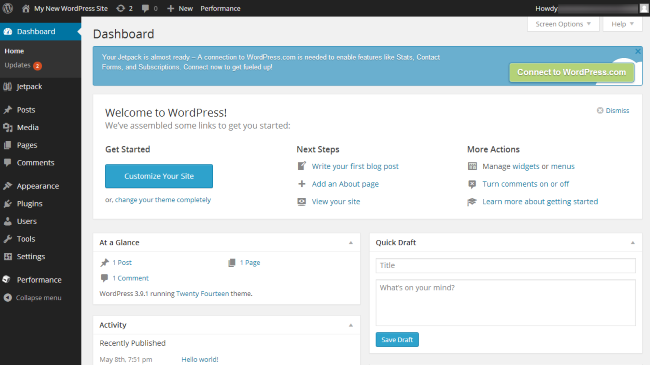
FatCow doesn’t offer industry-standard cPanel (which is usually not good news), but a custom control panel which is (fortunately) rather user-friendly, although a bit dated. Alternatively, they offer a point-and-click website builder with a variety of customizable templates and themes, as well as setup scripts for WordPress. As FTP access is a standard offer, more experienced users can build their websites without restrictions and immediately.
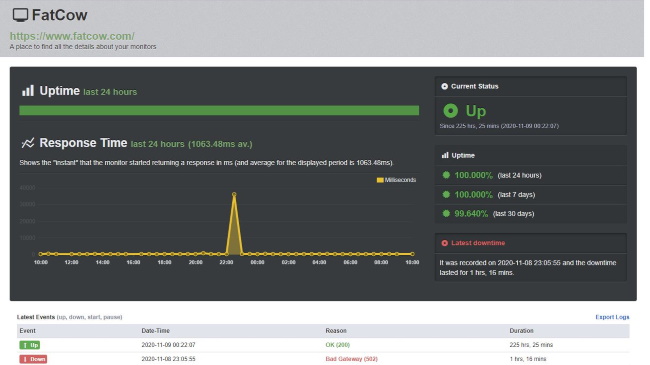
Speed and experience
Besides promising “more speed” with VPS and dedicated hosting products, FatCow doesn’t make more explicit promises. Needless to say, we had to check the speed performance of FatCow’s main website for ourselves before jumping to conclusion. After performing a speed test provided by GTmetrix we got our results, though not what we had hoped for. The time it took to completely load the page was alright (3.8 seconds compared to the average result of 8.1), but the process needed a total of 145 requests, which is a good deal more than the average of 89. In addition, most of the core metrics were average or below-average which resulted in a rather low grade for the overall performance, an E (56%).
Since FatCow doesn’t offer an uptime guarantee, we weren’t expecting much and, unfortunately, were right to do so. After performing an uptime test by UptimeRobot on FatCow’s main website for two weeks, we got a result of 99.64% uptime, which is unacceptable for today’s standard. There were four separate instances of downtime (with the shortest lasting for 4 minutes and the longest for 1 hour and 16 minutes) which is quite a number considering the test ran for two weeks only.
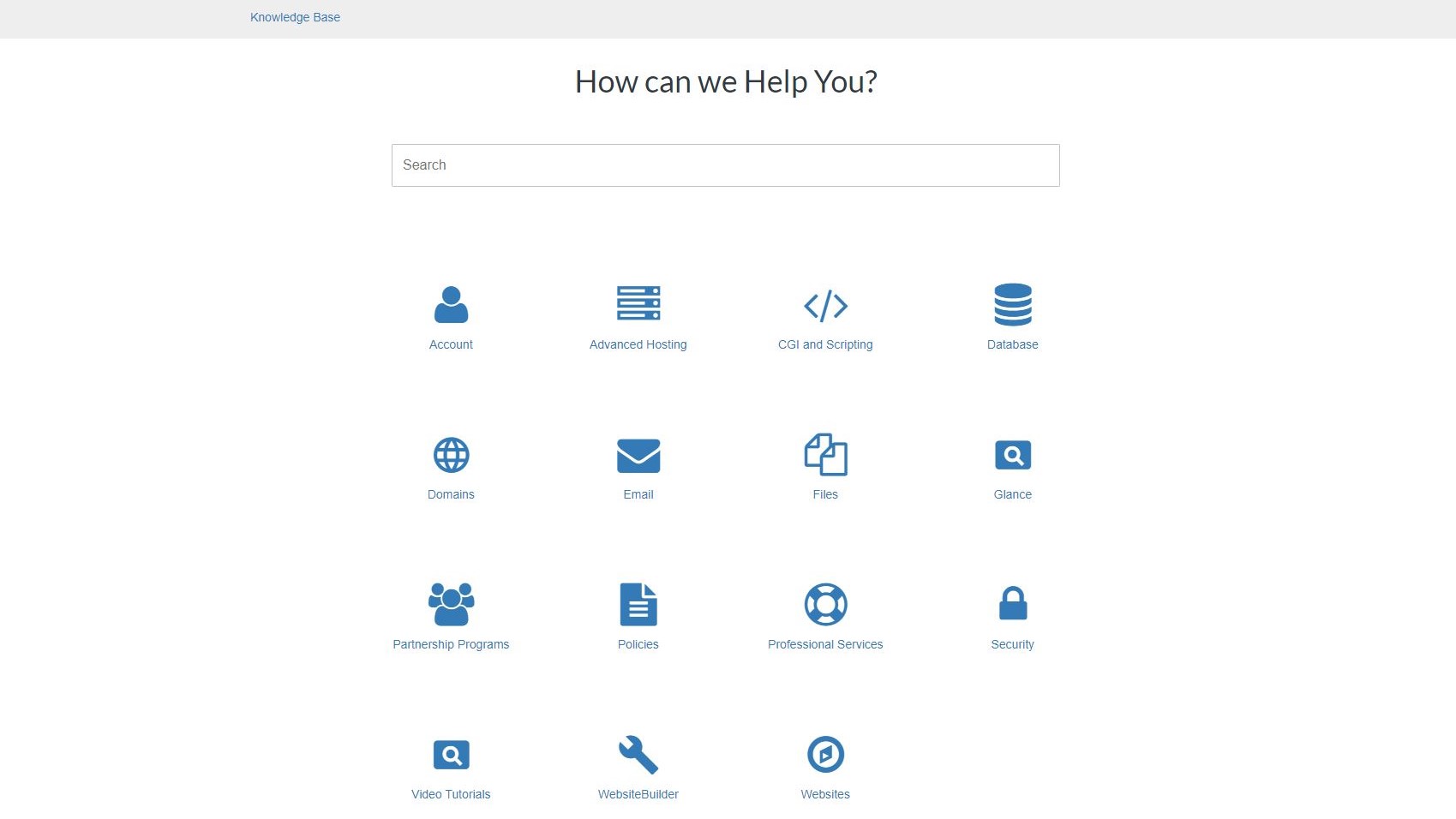
Support
If you find yourself in need of assistance, choosing “Help” on the header of FatCow’s website will provide a few alternatives. As for self-help options, there are “Knowledge Base” and “User Guides”, but picking either of them will lead you to the same page, which is a rather standard knowledgebase. Users can browse it using the search box or selecting one of the available categories (Account, Database, Domains and so on). Among them, we were pleasantly surprised with a “Video Tutorials” category, at least until we picked it out and once again confirmed that appearance can be deceiving.
In all fairness, the guides were thorough and easy-to-follow, but some of them had video tutorials and others didn’t, and we are referring to those which belong to the “Video Tutorials” category. However, since the knowledgebase is guide-packed and comprehensive, we will not take this as a significant issue.
Alternately, you can get in touch with FatCow’s support team via toll-free telephone and live chat, which are available 24/7.
The competition
Both HostGator and FatCow are experienced web hosting providers offering fairly-priced entry-level plans and a user-friendly approach, geared towards newcomers. The two of them offer a free domain registration, many unlimited features (disk space, e-mails, and bandwidth) and an easy-to-use website builder. However, Hostgator’s plans come with a familiar industry-standard cPanel, while FatCow uses a custom control panel aimed at newbies, so this might be a decisive point for many.
Another popular hosting option for beginners and experts alike is Bluehost. While both Bluehost and FatCow provide plenty of attractive features, Bluehost’s hosting solution comes at a lower cost, with a SSL certificate and (we can’t emphasize this enough) with “state-of-the-art” hardware and an uptime guarantee of 99.98%.
The green-energy powers both Krystal Hosting and FatCow, although the latter boasts less about it. Although Krystal Hosting seems more polished overall, both are quite competent hosts and provide a good quality-price ratio. However, when performance is concerned, Krystal Hosting has a faster server and provides its users with a 99.99% uptime guarantee.
Although FatCow’s chubby cow is a lovely sight, Hostens’s little hamster is as cute as a cupcake and definitely wins by the criterion of mascot adorability. However, when it comes to what these can offer from hosting-related services, both are quite user-oriented, accessible hosts for new users and provide a 30-days money-back guarantee. Yet, FatCow’s guarantee is valid for credit card payments only, while with Hostens it is valid for PayPal as well.
Final verdict
When compared to some of the big names in the business, FatCow’s hosting solution may seem a bit simplistic, especially when taking into account its mediocre performance. At the same time, they are veterans in their field, dedicated to protecting the environment and offer an exceptionally beginner-friendly approach. With all things considered, if you have simple needs and don’t mind short-term pricing, give FatCow a chance. If not, you might want to consider finding a suitable alternative in hosts like Hostgator, Hostinger or Bluehost.
- We've also highlighted the best web hosting
Mirza Bahic is a freelance tech journalist and blogger from Sarajevo, Bosnia and Herzegovina. For the past four years, Mirza has been ghostwriting for a number of tech start-ups from various industries, including cloud, retail and B2B technology.
